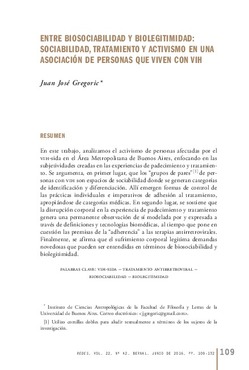Entre biosociabilidad y biolegitimidad : sociabilidad, tratamiento y activismo en una asociación de personas que viven con VIH
Between biosociability and biolegitimity : sociability, treatment and activism in an association of people living with HIV – AIDS
Abstract
En este trabajo, analizamos el activismo de personas afectadas por el VIH-sida en el Área Metropolitana de Buenos Aires, enfocando en las subjetividades creadas en las experiencias de padecimiento y tratamiento. Se argumenta, en primer lugar, que los “grupos de pares” de personas con VIH son espacios de sociabilidad donde se generan categorías de identificación y diferenciación. Allí emergen formas de control de las prácticas individuales e imperativos de adhesión al tratamiento, apropiándose de categorías médicas. En segundo lugar, se sostiene que la disrupción corporal en la experiencia de padecimiento y tratamiento genera una permanente observación de sí modelada por y expresada a través de definiciones y tecnologías biomédicas, al tiempo que pone en cuestión las premisas de la “adherencia” a las terapias antirretrovirales. Finalmente, se afirma que el sufrimiento corporal legitima demandas novedosas que pueden ser entendidas en términos de biosociabilidad y biolegitimidad. In this article we analyze the associative ways and political activism of people living with HIV-AIDS in Buenos Aires suburbs, focusing on the subjectivities created in the illness and treatment experience. Firstly, we state that people with HIV-AIDS mutual aid groups’ allow a new sociability that generates identification and differentiation among themselves. In these groups ways of controlling individual behaviour emerge together with adherence to antiretroviral treatment (ARVT) imperatives adopting medical categories. Secondly, we argue that body disruption gives rise to a permanent self observation shaped by and expressed through biomedical definitions and technologies, while it undermines the premises of adherence to treatment. Finally, we believe that embodied suffering validates new demands that should be understood in terms of biosociality and biolegitimity.

